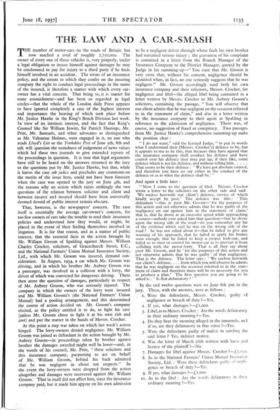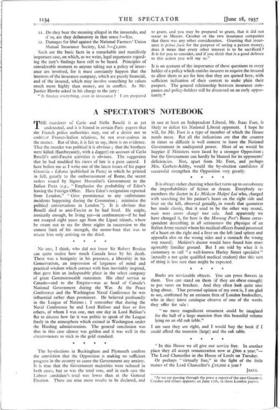THE LAW AND A CAR-SMASH
THE number of motor-cars on the roads of Britain has now reached a total of roughly 2,750,000. The owner of every one of those vehicles is, very properly, under a legal obligation to insure himself against damages he may be condemned to pay for injury to a third party if he finds himself involved in an accident. The terms of an insurance policy, and the extent to which they confer on the insuring company the right to conduct legal proceedings in the name of the insured, is therefore a matter with which every car- owner has a vital concern. That being so, it is matter for some astonishment—and has been so regarded in legal circles—that the whole of the London daily Press appears to have ignored completely a case of the highest interest and importance the hearing of which took place before Mr. Justice Hawke in the King's Bench Division last week. In view of its intrinsic interest, and the fact that King's Counsel like Sir William Jowitt, Sir Patrick Hastings, Mr. Pritt, Mr. Samuels, and other advocates as distinguished as Mr. Valentine Holmes, were engaged in it, no one who reads Lloyd's List or the Yorkshire Post of June 5th, 8th and 9th will question the soundness of judgement of news values which led these two journals to give extended reports of the proceedings in question. It is true that legal arguments have still to be heard on the answers returned to the jury to the questions put by Mr. Justice Hawke, but that, while it leaves the case sub judice and precludes any comments on the merits of the issue here, could not have been foreseen when the case was opened to the jury on June 4th, and the reasons .why an action which raises strikingly the two questions of the relation between solicitor and client and between insurer and insured should have been universally deemed devoid of public interest remain obscure.
That, however, is the newspapers' concern. The case itself is essentially the average car-owner's concern, for too few owners of cars take the trouble to read their insurance policies and understand how they would, or might, be placed in the event of their finding themselves involved in litigation. It is for that reason, and as a matter of public interest, that the essential facts in the action brought by Mr. William. Groom of Spalding against Messrs. William Charles Crocker, solicitors, of Gracechurch Street, E.C., and the National Farmers' Union Mutual Insurance Society, Ltd., with which Mr. Groom was insured, demand con- sideration. In August, 1934, a car which Mr. Groom was driving, and in which his brother Mr. Aubrey Groom was a passenger, was involved in a collision with a lorry, the driver of which was convicted for dangerous driving. There then arose the question of damages, particularly in respect of Mr. Aubrey Groom, who was seriously injured. The company in which the owners of the lorry were insured and Mr. William Groom's (the National Farmers' Union Mutual) had a pooling arrangement, and this determined the course of action decided on. Mr. Groom's company elected, as the policy entitled it to do, to fight his case (unless Mr. Groom chose to fight it at his own risk and cost) and put the matter in the hands of Messrs. Crocker.
At this point a step was taken on which last week's action hinged. The lorry-owners denied negligence. Mr. William Groom was joined as defendant in the action brought by Mr. Aubrey Groom—in proceedings taken by brother against brother the damages awarded might well be lower—and, in the words of his counsel, Mr. Pritt, " these solicitors and this insurance company, purporting to act on behalf of Mr. William Groom, behind his back admitted that he was negligent in about ten respects." In the event the lorry-owners were dropped from the action altogether and damages were recovered against Mr. William Groom. That in itself did not affect him; since the insurance company paid, but it made him appear -Ori his own adinisiiOn to be a negligent driver through whose fault his own brothel had sustained serious injury ; the gravamen of his complaint is contained in a letter from the Branch Manager of the Insurance Company to the District Manager, quoted by the Judge in his summing-up—" You state that Mr. Groom is very cross that, without his consent, negligence should be admitted when, in fact, no one seriously suggests that he was negligent." Mr. Groom accordingly sued both his own insurance company and their solicitors, Messrs. Crocker, for negligence and libel—the alleged libel being contained in a letter written by Messrs. Crocker to Mr. Aubrey Groom's solicitors, containing the passage, " You will observe that our client admits that he was negligent on the occasion referred to in the statement of claim," and also in a letter written by the insurance company to their agent at Spalding in reference to the admission of negligence. There was, of course, no suggestion of fraud or conspiracy. Two passages from Mr. Justice Hawke's comprehensive summing-up make the position clear : " I do not want," said the learned Judge, " to put in words what I understand their [Messrs. Crocker's] defence to be, but it appears to me to be this, that because they have agreed that the insurance company shall conduct his defence and have control over his defence they may put up, if they like, some
defence which is not his defence, and without telling him That seems to be their defence : We have got absolute control, and therefore you have no say either in the conduct of the defence or as to what the defence shall be.' "
And again a little later : " Now I come to the question of libel. Messrs. Crocker wrote a letter to the solicitors on the other side and said : 'We enclose herewith our client's defence, service of which kindly accept by post.' The defence was this : ' This defendant '—this is poor Mr. Groom—' for the purposes of this action and not otherwise admits that he was guilty of the negligence set out against him in the statement of claim,' that is, that he drove at an excessive speed while approaching a corner—nobody ever asked him that question—that he drove upon the wrong side of the road—do you remember any bit of the evidence which said he was on the wrong side of the road ? he was not asked about it—that he failed to give any warning of his approach, that he failed to apply his brakes soon enough, that he failed to keep a proper look-out, and failed so to steer or control his motor-car as to prevent it from colliding with the motor-lorry. That is all they say about poor Mr. Groom, and he for the purposes of this action and not otherwise admits that he was guilty ' of that negligence. That is the defence. The letter says : We enclose herewith our client's defence, . . . from which you will observe he admits that he was negligent on the occasion referred to in the state- ment of claim and therefore there will be no necessity for you to produce a plan.' The first question you are going to be asked is : Is that defamatory ? ' " In the end twelve questions were on June 8th put to the jury. These, with the answers, were as follows : 1. ,Were the defendants, Messrs. Crocker, guilty of negligence or breach of duty ?—Yes.
2. If yes, what damages ?—L t,000.
3. Libel, as to Messrs. Crocker : Are the words defamatory in their ordinary meaning ?—Yes.
4. Do they bear the meaning alleged in the innuendo, and if so, are they defamatory in that sense ?—Yes.
5. Were the defendants guilty of malice in sending the said letter ? Yes, indirect motive.
6. Was the letter of March 26th written with leave and licence of the plaintiff ?—No.
7. Damages for libel against Messrs. Crocker ?—Er,000.
8. As to the National Farmers' Union Mutual Insurance Society, Ltd. : Were these defendants guilty of negli- gence or breach of duty ?—Yes.
9. If yes, what damages ?—L 1,000. to. As to the libel : Are the words defamatory in their ordinary meaning ?—Yes. i. Do they bear the meaning alleged in the innuendo, and if so, are they defamatory in that sense ?—Yes.
12. Damages for libel against the National Farmers' Union Mutual Insurance Society, Ltd. ?—£1,000.
Such are the basic facts in a remarkable and manifestly important case, on which, as we write, legal arguments regard- ing the jury's findings have still to be heard. Principles of considerable moment to anyone taking out a policy of insur- ance are involved, for it must constantly happen that the interests of the insurance company, which are purely financial, and of the insured, which may involve something he values much more highly than money, are in conflict. As Mr. justice Hawke asked in his charge to the jury :
" Is finance everything, even in insurance ? I am prepared
to grant, and you may be prepared to grant, that it did not occur to Messrs. - Crocker or the two insurance companies that there was any other consideration. Granting that insur- ance is prima fade for the purpose of saving a person money, does it mean that- every other interest is to be sacrificed ? It is for you to consider, and if you think that is a good defence to this action you will say so."
It is on account of the importance of these questions to every holder of a policy which entitles insurers to require the insured to allow them to act for him that they are quoted here, with sufficient indication of their context to make plain their purport. The general relationship between insurance com- panies and policy-holders will be discussed on an early oppor- tunity.*















































 Previous page
Previous page